Record Journal
Holocaust Survivors Share Stories at Neag School of Education Event
Wallingford Schools Chief Honored by UConn’s Neag School of Education
Stronger Business Collaborations Key to Career Education’s Future Success
Editor’s Note: The following story originally appeared on UConn Today, the University of Connecticut’s news website.
For more than a decade, school districts across the country have been revamping their career and technical education programs to better prepare students with the high-tech skills in demand today.
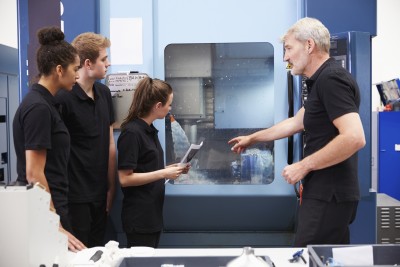
But as transformative as many of these so-called CTE programs have been, a new report by the Manhattan Institute for Public Policy and co-authored by UConn assistant professor of education policy and leadership Shaun Dougherty cautions that there is much important work that still needs to be done.
The report finds that continued program innovation, greater investments in resources, and stronger collaborations with business and industry are necessary to build on the CTE movement’s initial success.
Released today at a conference on Career and Technical Education: Fulfilling The Promise, at which former U.S. Secretary of Education Arne Duncan gave the keynote address, the report takes a close-up look at New York City’s burgeoning CTE program, one of the nation’s strongest and most established. Tamar Jacoby, a former New York Times editor and president of Opportunity America, a Washington D.C.-based nonprofit working to promote economic mobility, also contributed to the report as co-author.
While the research looks specifically at New York City’s programs, the authors describe what’s happening in New York as a “Laboratory for the Nation.” Dougherty, a specialist in applied quantitative analysis of education policies and programs with UConn’s Neag School of Education, says many of the report’s core conclusions and recommendations can be applied to other CTE programs around the country.
“On the cutting edge, wrestling to implement the tenets of the CTE revolution, New York City holds vital lessons for educators across America,” the report states. “The challenge in the years ahead: to maintain the pace of innovation and take it to the next level. With a few modifications…, New York can remain in the vanguard, building the workforce of tomorrow and providing a model for the nation.”
“The challenge in the years ahead: to maintain the pace of innovation and take it to the next level.” Manhattan Institute report, The New CTE: New York City as Laboratory for the Nation
New York City’s school districts under former Mayor Michael Bloomberg were among the first to embrace the new CTE concept. Once called “vocational education,” career and technical education encompasses not just the traditional trades such as carpentry, metal work, and plumbing, but also high-tech skills such as information technology, health care, engineering, and business management. The number of CTE-dedicated schools in New York City has nearly tripled in recent years, from 15 in 2004 to about 50 today, and includes seven “early-college” high schools, spanning grades 9-14, which many see as a national model.
Early evidence suggests that students who enroll in CTE schools have better attendance rates and are more likely to graduate, according to the report. Classes tend to be smaller, allowing for greater focus and engagement.
But as promising as New York’s CTE program may seem, it is not without its share of significant challenges.
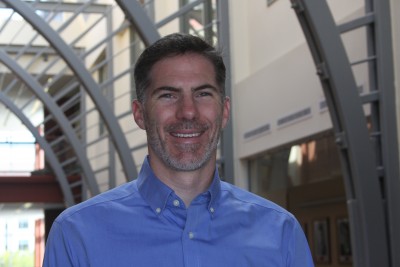
State policy dictates that students who enroll in New York’s CTE programs must pass the same rigorous academic performance tests as their peers in more traditional public high schools in addition to meeting the skill requirements of an individual trade or discipline. Dougherty’s report finds that balancing those dual demands in a limited school year is one of the primary challenges facing New York educators. While teachers universally endorse the tough academic standards, many “struggle to find time for everything that students need to accomplish,” the report states.
On a more positive note, the report praised New York City’s CTE programs for having the good fortune to be engaged with such industry giants as IBM and Con Edison. Yet the authors found that the city continues to struggle to find new businesses to partner with the program and schools lack dedicated staff to make such partnerships especially meaningful.
Work-based learning, which the authors call “the pinnacle of the CTE experience,” continues to fall short in New York when it comes to bona fide on-the-job work experience, the report says. According to a recent survey, only 1,575 students – less than 2 percent of all New York CTE students – completed internships in 2014.
One of the most promising aspects of CTE is its ability to serve as a bridge from secondary to postsecondary education or training. New York City has a vibrant partnership with the City University of New York, which has opened 17 schools over the past two decades, including seven dedicated exclusively to CTE. This partnership exposes students to postsecondary education, and can ease the transition for students who might otherwise lose their way. But like their peers in business, these partnerships with higher education institutions are time-consuming and difficult to sustain with current resources, the report notes.
At the policy level, the report recommends that New York City overhaul its state standards for work-based learning, allowing for clearer distinctions between career exposure through field trips, job shadowing, and career fairs and actual work experience through on-the-job internships. Along with this new mandate should come additional resources in terms of both funding and staffing to help schools better coordinate and manage their CTE programs, the report states.
Lastly, the report finds that despite great investment and the initial general success of New York City’s CTE programs, they are restrained by state policy that currently takes a narrow view of CTE teacher certification, approved CTE career pathways, and potential industry partners. Today’s fast-paced business climate demands greater flexibility and adaptability, the report states. State policy should be overhauled to allow school districts greater leeway in preparing for and responding to a rapidly changing job market, new technologies, and the latest in-demand skills.
“The workforce has been changing, and it will continue to change,” says Dougherty. “One of the challenges is both identifying the current state of the labor force and watching it as it evolves. I would like to see evidence that people are thinking more dynamically about how the workforce is shifting and how CTE offerings are responding to that shift in continuous cycles over time.”
A second CTE report, this one supported by the Thomas B. Fordham Institute and authored by Dougherty, is expected to be released in early April. That report will focus on specific outcomes for high school students enrolled in CTE programs in another state.
Stronger Business Collaborations Key to Career Education’s Future Success
UConn Today (Shaun Dougherty’s recent co-authored report on CTE covered)
Creativity in the Classroom (VIDEO)
American Psychological Association (Segments from informational film written by James Kaufman and Ronald Beghetto)
On the Move: Promotions, New Hires & Advancements
New Haven Register (Mention of Gladis Kersaint’s appointment as dean)
Meet the Neag School’s New Alumni Relations Director
The Neag School of Education is pleased to welcome Caitlin Trinh as the School’s new director of alumni relations.
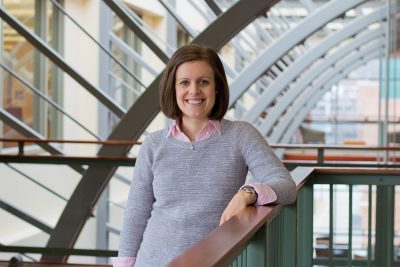
Trinh arrived earlier this month at the Neag School after having served for more than five years as alumni relations director at UConn’s College of Liberal Arts and Sciences. In that role, she was responsible for connecting with and engaging more than 95,000 CLAS alumni worldwide. She also worked with the University’s Center for Career Development to offer current UConn students greater access to the CLAS alumni network through alumni-student mentoring and professional development opportunities.
Previous to that, she served in the roles of assistant director of admission and senior admissions counselor at the University of Saint Joseph in West Hartford, Conn.
Trinh is a 2007 UConn alum of the College of Liberal Arts and Sciences and a native of Hamden, Conn.
Read an introductory letter from Trinh here.
Interested in getting involved in Neag School alumni events or initiatives? Reach out directly to Caitlin Trinh at caitlin.trinh@uconn.edu.
UConn’s Black Male Learning Community Draws Criticism
Education Dive (Erik Hines quoted)
Neag School Celebrates 2016 Alumni Awardees
Members of the Neag School of Education Alumni Society, as well as faculty, staff, and administrators of the Neag School of Education gathered this past Saturday on the UConn Storrs campus with the 2016 Alumni Awards honorees and their guests for the 18th Annual Alumni Awards Celebration. Seven outstanding Neag School graduates were recognized at the event.
“Each of our 2016 awardees embodies a tremendous sense of professional dedication as well as a commitment to going above and beyond his or her traditional job description,” says Dean Richard Schwab. “Interestingly, every one of our honorees this year currently works in the state of Connecticut – which is yet one more source of immense pride for us, to have these exceptional graduates going on to serve so admirably in such a wide variety of capacities across our state.”
Outstanding Early Career Professional Award
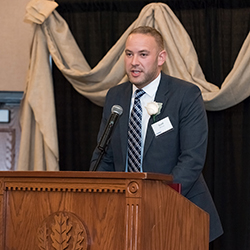 Dr. Scott R. McCarthy – Program director of special education and student services for Darien (Conn.) Public Schools
Dr. Scott R. McCarthy – Program director of special education and student services for Darien (Conn.) Public Schools
Dr. Scott R. McCarthy earned four degrees from UConn, beginning with his BS in 2008 in psychology. He later received from the Neag School his MA and 6th Year Diploma, followed by his Ph.D. in educational psychology, with a concentration in school psychology. McCarthy is currently program director of special education and student services for Darien (Conn.) Public Schools.
McCarthy assumed the role of program director in Darien this past November. Prior to his role in Darien, McCarthy was a school psychologist for Greenwich Public Schools, where he not only supported students, but also was responsible for the planning and professional learning of psychologists and social workers. His involvement in the district was extensive, as he ran an after-school videogame club and tutoring program, and was a member of the Crisis Team, Student Assistance Team, and District Anti-Bullying Committee, and chair of the Positive Behavioral Interventions & Supports (PBIS) Committee.
Outstanding School Educator Award
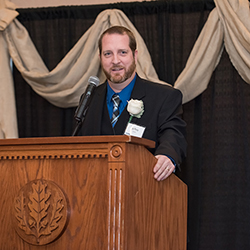 Jeffrey A. Spivey – Challenge and enrichment program teacher at Coventry (Conn.) Public Schools
Jeffrey A. Spivey – Challenge and enrichment program teacher at Coventry (Conn.) Public Schools
Jeffrey A. Spivey graduated magna cum laude from UConn’s Neag School with a BS in elementary education before continuing on to receive his MA in education. Spivey is currently a challenge and enrichment program (CEP) teacher at Coventry (Conn.) Public Schools.
Spivey has instituted programs in technology and gifted and talented education, as well as created and managed a Student IT Help Desk for Coventry High School, which expanded learning opportunities by incorporating innovative technologies with class curriculum. He also developed the Coventry Future Problem Solving Program for middle and high school students that sent several Coventry students to the International Convention.
In addition to his role in the Coventry school district as a CEP teacher, Spivey serves as a middle school instructor and coach and as the district’s education and technology coach. He has been the leader in implementing innovative technologies into Coventry classrooms, including Google Classroom and iPads. As a talented videographer, he also captures video of school events and meetings and produces a morning news show with his students.
Outstanding School Administrator Award
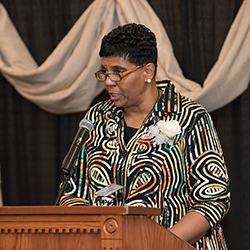 Gayle Allen-Greene – Executive principal at Bulkeley High School and Culinary Arts Academy at Weaver, both in Hartford, Conn.
Gayle Allen-Greene – Executive principal at Bulkeley High School and Culinary Arts Academy at Weaver, both in Hartford, Conn.
Gayle Allen-Greene completed her BA and MA at Springfield College before receiving her Executive Leadership Program Certificate from the Neag School in 2009. Allen-Greene is currently executive principal at Bulkeley High School and Culinary Arts Academy at Weaver, both in Hartford. She began her career in the Hartford Public School district 37 years ago as a physical education teacher and coach.
Allen-Greene has instituted several programs to improve education for minority students and student retention rates. During her tenure as principal, she has improved graduation rates from an average of 29 percent to 73 percent. Despite budget constraints, she was instrumental in developing Bulkeley’s Teacher Prep and Humanities academies, along with comprehensive advanced placement and early college experience programs. She has redesigned the curriculum to include a student-centered approach to teaching and learning through English language learner instruction and blended learning.
Allen-Greene’s commitment to students’ success extends beyond the classroom to her passion for athletics. She has helped preserve the Bulkeley High School athletic program as one of the founders of the School’s Athletic Hall of Fame.
Outstanding School Superintendent Award
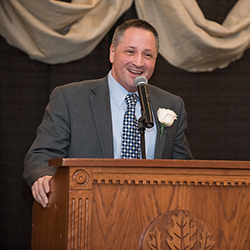 Dr. Salvatore F. Menzo – Superintendent of Schools in Wallingford (Conn.) Public Schools
Dr. Salvatore F. Menzo – Superintendent of Schools in Wallingford (Conn.) Public Schools
Dr. Salvatore F. Menzo received his MA, 6th Year Diploma, Executive Leadership Program Certificate, and Ed.D. in educational leadership from the Neag School, and a BA from Connecticut College. Since 2009, Menzo has served as superintendent of the Wallingford (Conn.) Public Schools.
The many initiatives Menzo has implemented in the Wallingford school district include the “Wallingford 100” initiative; through funding from donations, Menzo gathered staff members to form a 21st Century Innovation Team, which works toward achieving a 100 percent graduation rate and a 100 percent post-high school success rate for Wallingford students. Menzo has also positioned the district as a leader in personalized learning and implementing Common Core and the teacher evaluation process.
To engage these community stakeholders, Menzo is rarely behind a desk. Instead, he’s visiting classrooms in one of his 12 schools, attending a student sporting event, visiting the senior center, or traveling abroad with students. His transparency and integrity with the Wallingford community have established him as a leader far beyond the school system. Menzo’s leadership at Wallingford also includes his “three words” initiative – each year, he selects three words for staff members to embody. For 2016, Menzo is guiding Wallingford teachers along the road to investigate, inform, and inspire.
Outstanding Higher Education Professional Award
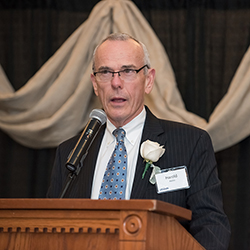 Dr. Harold F. Abeles – Professor of music and music education and co-director of the Center for Arts Education Research at Teachers College, Columbia University, in New York, N.Y.
Dr. Harold F. Abeles – Professor of music and music education and co-director of the Center for Arts Education Research at Teachers College, Columbia University, in New York, N.Y.
Dr. Harold F. Abeles received his BA and MA in music education from UConn before completing his Ph.D. at the University of Maryland in 1971. For more than 30 years, Abeles has been a professor of music education at the Teachers College of Columbia University, where he also serves as co-director of the Center for Arts Education Research.
Abeles is a distinguished researcher in the field of music education. His early study on the sex stereotyping of music instruments, published in the Journal of Research in Music Education, was the first of its kind to examine students’ and teachers’ perceptions of gender and their impact on music education. His most recent research examines the roles social media and gender stereotyping play in music teacher identity and the formation of professional learning communities.
Abeles’ work is not confined to academia; instead, he works to improve music education for children in schools across the nation. His study guide for HBO’s “Master Class” series, including lesson plans and class activities, is distributed free of charge to middle and high schools in New York, Los Angeles, and Miami. He has secured more than $1 million in grants, which he has used to evaluate symphony orchestras’ education programs that provide an arts education for under-served children in Hartford, Detroit, Baltimore, Cleveland, and New York City.
Outstanding Professional Award
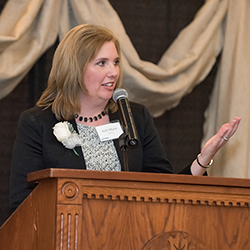 Dr. Kelli-Marie Vallieres – President and CEO of Sound Manufacturing, Inc. in Old Saybrook, Conn.
Dr. Kelli-Marie Vallieres – President and CEO of Sound Manufacturing, Inc. in Old Saybrook, Conn.
Dr. Kelli-Marie Vallieres received three UConn degrees, her most recent being a Ph.D. in educational leadership and adult learning from the Neag School in 2007. Prior to her Ph.D., she earned a MA in educational leadership and adult learning from the Neag School and a BS in business management from UConn. Vallieres is the president and CEO of Sound Manufacturing, Inc. in Old Saybrook, a producer of sheet metal. She also serves on the New England Board of Higher Education as the director of the Problem Based Learning Resource Center and the President of the Eastern Advanced Manufacturing Alliance.
In 2009 and 2010, Sound Manufacturing, Inc., faced the risk of a massive downsize. However, due to Vallieres’ knowledge of educational research, the company was not only able to recover, but thrive. Vallieres used insight from employees to determine how to lead her company in a new direction, founding Monster Power Equipment, a company within Sound Manufacturing, Inc. This venture, which was featured on the Discovery Channel’s program “Made in America,” now contributes a third of the two companies’ annual sales and has helped the company increase its workforce by roughly 10 percent this year.
Vallieres implements education practices into her role at Sound Manufacturing, Inc., using problem-based learning (PBL) to promote professional and technical skill development. She accomplishes the PBL approach by helping technical college students land internships and challenging them to solve real-life scenarios in the classroom. Most recently, she implemented a sheet metal manufacturing program at Three Rivers Community College – a trade that is essential to several large-scale Connecticut employers. Vallieres also works with local school systems to implement more STEM skills into the curriculums.
Distinguished Alumna Award
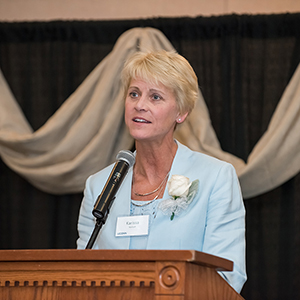 Dr. Karissa L. Niehoff – Executive director for the Connecticut Association of Schools (CAS)
Dr. Karissa L. Niehoff – Executive director for the Connecticut Association of Schools (CAS)
Dr. Karissa L. Niehoff earned her Ed.D. in educational leadership from the Neag School at UConn in 2010. Prior to this degree, she earned a BS in physical education from the University of Massachusetts, an MA in school health education from Southern Connecticut State University, and a 6th Year Diploma in educational leadership from Central Connecticut State University. Niehoff is currently the executive director for the Connecticut Association of Schools (CAS).
As executive director of CAS (and its first-ever woman director), Niehoff is responsible for all aspects of the organization, including the Connecticut Interscholastic Athletic Conference, Connecticut Student Activities Conference, and Unified Sports. She is also a member of the National Federation of State High School Association’s Board of Directors. Niehoff has a passion for athletics that extends beyond her roles on various athletic committees. She has fulfilled several roles as a coach, physical education teacher, and personal wellness teacher, as well as co-founder of the National Passing the Torch Academy for Youth Sport Leadership. For six years, she was an integral member of the United States Olympic Committee.
Niehoff’s expertise, passion, and ability to relate to others have made her a renowned keynote speaker and presenter, especially on topics regarding teaching and learning strategies and coaching programs. Some of the distinguished organizations for which she has presented include the Connecticut Department of Education and the National Association for Girls and Women in Sports.
